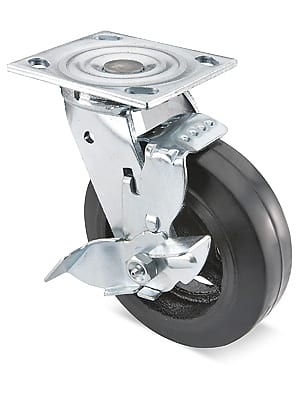
One of the key components of any caster is its ability to put on the brakes, quite literally, and stop all forward or backward movement. This essential feature is often overlooked by those in the market for a new set of casters, largely because most people focus on the importance of movement, rather than on the importance of stopping it. In some cases, however, there is nothing more important than stopping an office chair, desk, or piece of heavy machinery, from rolling away and toward a minefield of potential disasters.
Shopping for casters with brakes is relatively straightforward, since most casters are rated by weight capacity and include the brakes needed to stop the heaviest load permitted by each individual wheel type and hardware assembly. Before deciding on any specific caster, though, there are some important considerations to be made.
Always Err on the Side of “Too Heavy”
When buying a new set of casters, most people buy the model that holds just enough weight to support their furniture or mechanical equipment. Most buyers leave little room for error in terms of weight capacity, and this can cause major problems in the future, both in terms of the caster itself and the ability of the brake to stop any movement that might occur after the caster has been attached.
The brakes that are installed with each caster are specifically designed to be able to stop the maximum weight load that is being carried by that caster. Heavier loads are inherently harder to stop, thanks in no small part to the laws of physics that govern things like friction and momentum. Buying the “bare minimum” caster can have disastrous effects in terms of the caster’s integrity, but it can be even worse if an object is set in motion, and cannot be prevented from completing that motion.
When purchasing any caster, be sure to buy the model that holds the heaviest load conceivable, plus a modest margin of error. While this might be overcompensation in some cases, it’s a commitment to safety and integrity that should not be ignored.
Consider both Brakes and Wheel Locks
Brakes and wheel locks function slightly differently, with a wheel lock essentially preventing the wheel from moving by locking the part of the wheel that turns. Brakes, conversely, use pressure and fiction applied on the tread of the wheel to stop forward movement. Both methods are effective, though brakes are more logical for applications where a piece of furniture or equipment will be regularly moved. Brakes are easier to click into place on demand, using the food, than wheel locks, which are a bit more difficult to operate on a frequent basis.
Get in Touch with Douglas Equipment to Order Casters with Brakes
We have been serving commercial, medical, and office customers with excellent casters and other products for decades. Our staff is able to help with any purchasing decision or equipment question, and they’ll do it with a friendly and professional demeanor that is all too hard to find in today’s retail economy. Be sure to contact us today and put our service, our knowledge, and our history of success, to work for your company.




